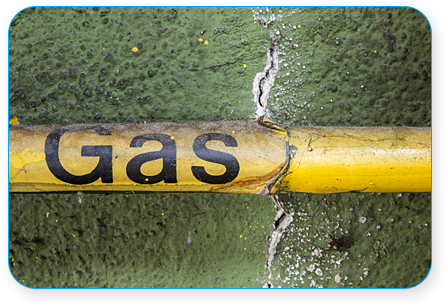Natural gas is used to power a variety of household appliances including furnaces, fireplaces, dryers, stoves, and much more. Even in today’s modern world where everything has gone digital and things run on electricity, there is most likely at least one appliance within your home that still runs on gas.

What Exactly Is Natural Gas?
Natural gas is known to be the world’s cleanest type of fossil fuel. It only produces carbon dioxide, water paper, and miniscule amounts of nitrogen oxide once ignited. Moreover, it does not have any smell or color to it.
While it is a generally safe and effective source of power, it is a highly flammable material that could cause potential house fires and gas poisoning if there is a leak. Because of this, it is highly important to know the signs that you have a gas leak, and what you can do to prevent leaks from happening.
How To Tell If You Have A Gas Leak?
There are six main signs that could indicate a gas leak in your home. Understanding them can help prevent health risks, fires, and can potentially save lives.
Sign #1: If you smell rotten eggs
Because natural gas does not have a smell to it, gas companies would add chemicals called odorants in order to mimic the smell of sulfur or rotten eggs. This is to ensure that homeowners can quickly determine a leak through the pungent odor
Sign #2: Hissing Sounds
This is mainly for larger gas leaks. Once you start to hear hissing sound surrounding your pipes or appliances, there is a chance it is due to a leak.
Sign #3: Dead or decaying plants
If you notice that the plants either inside or outside your home have died or are decaying, it could be a sign of a gas leak. Natural gas hinders the absorption of oxygen, which causes the plants to wilt and die, or even turn patches of grass yellow.
Sign #4: Air bubbles outside your home
If you have standing water such as puddles outside your home, and notice air bubbles appearing, it could be the gas leaking through the underground pipes.
Sign #5: Symptoms of gas poisoning
If you start to experience frequent headaches, dizziness, fatigue, nausea, or irregular breathing, these are symptoms of gas poisoning. More intense levels of gas exposure could potentially lead to memory problems, lack of concentration, loss of consciousness, or even suffocation.
Sign #6: Utility bills shooting up
If you notice an increase in how much you pay for gas usage per month, but there is no difference in your daily activity, then this could suggest a leak somewhere within your property.
What To Do In Order To Prevent A Gas Leak?
There are a number of ways you can prevent a gas leak, and they shouldn’t take too much of your time. Here are our top 3 preventative measures:
Inspect appliances on a regular basis
By checking all the devices and appliances that run on gas, you can help detect leaks early on and prevent it from causing any damage.
Install detectors
With natural gas and carbon monoxide detectors, you can be alerted soon as there are signs of leaks.
Know how to shut off the gas
Ensure that everyone knows how to shut it off in order to cut the supply in instances wherein a leak is suspected.